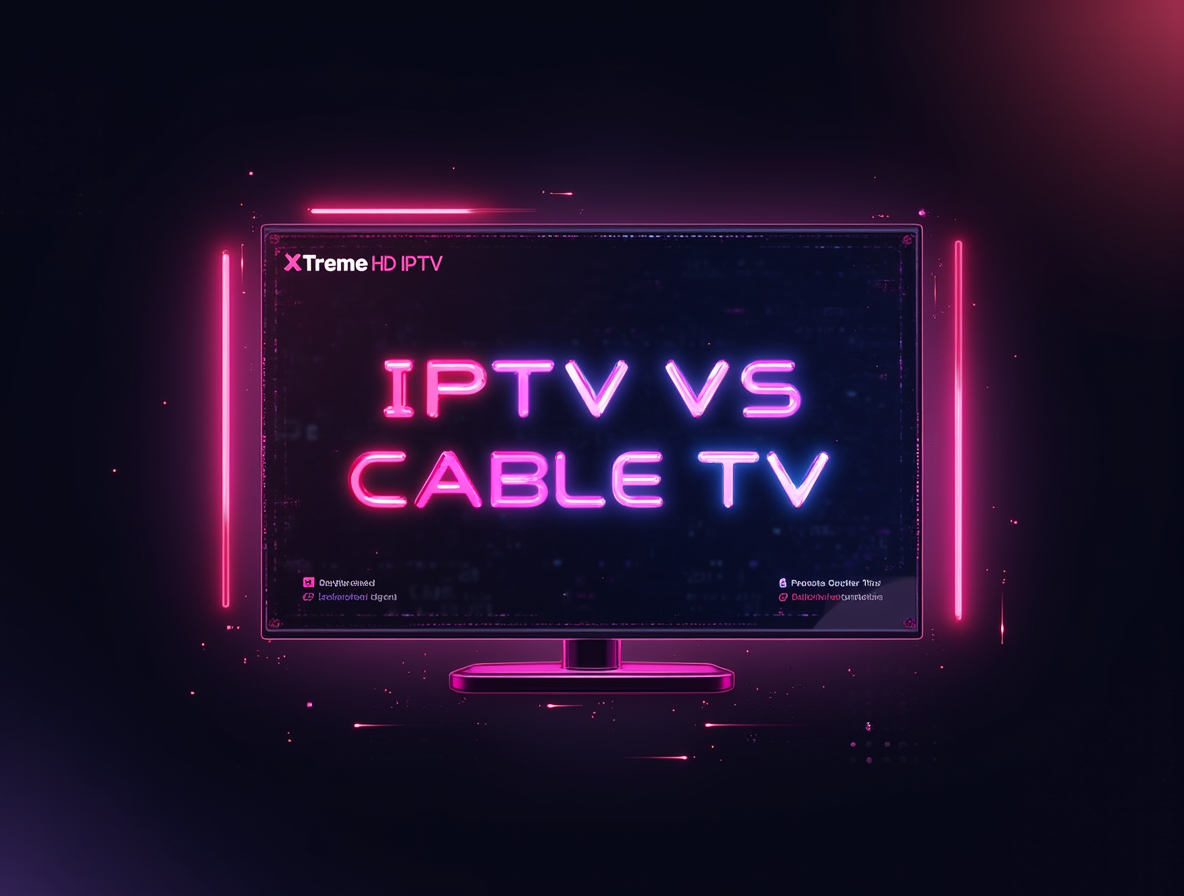IPTV vs Cable TV: Revolutionary Internet TV Wins 2025
The television landscape has dramatically shifted over the past decade, with traditional cable TV facing its biggest challenge yet: Internet Protocol Television (IPTV). As we move through 2025, more North American households are cutting the cord and embracing internet television solutions that offer superior flexibility, cost savings, and content variety.
This comprehensive guide explores the key differences between IPTV vs Cable TV, helping you understand why streaming technology is rapidly becoming the preferred choice for modern viewers in the USA and Canada.
What is IPTV?
Internet Protocol Television (IPTV) delivers television content through internet connections rather than traditional broadcast methods. Unlike cable TV that relies on coaxial cables and satellite signals, IPTV streams content directly to your devices using your existing broadband connection.
IPTV services offer three main types of content:
- Live Television: Real-time streaming of broadcast channels
- Video on Demand (VOD): Access to movies and shows whenever you want
- Time-Shifted Media: Catch-up TV and pause/rewind live content
The technology works by converting television signals into data packets that travel through your internet connection, providing a more flexible and customizable viewing experience than traditional cable alternatives.
How Cable TV Works
Traditional cable television operates through a network of coaxial cables that carry television signals from broadcast stations to your home. Cable providers receive signals from various sources including satellite feeds, local broadcast stations, and network feeds, then distribute this content through their physical infrastructure.
Cable TV systems typically include:
- Set-top boxes for channel decoding and navigation
- Coaxial cable connections running throughout your home
- Fixed channel packages determined by your service provider
- Scheduled programming with limited on-demand options
While cable TV has served households reliably for decades, its infrastructure limitations are becoming increasingly apparent in our digital-first world.

The Advantages of IPTV Over Cable
Cost Effectiveness
IPTV services typically cost 50-70% less than traditional cable packages. While cable TV bills in North America average $80-120 monthly, many IPTV solutions offer comprehensive channel lineups for $15-40 per month.
Superior Flexibility and Convenience
Internet television provides unmatched viewing flexibility:
- Multi-device streaming: Watch on smartphones, tablets, laptops, and smart TVs
- Location independence: Access your content anywhere with internet
- Personalized viewing: Create custom channel lists and favorites
- No installation hassles: Start watching immediately without technician visits
Enhanced Content Variety
IPTV services often provide:
- International channels from dozens of countries
- Niche programming not available on cable
- Premium movie and sports content
- Exclusive streaming originals
Advanced Features
Modern IPTV platforms include cutting-edge features that cable TV cannot match:
- Cloud DVR capabilities with unlimited storage
- Multi-screen viewing for simultaneous streams
- Interactive program guides with search functionality
- Instant replay and pause on live content
IPTV vs Cable TV: Direct Comparison
| Feature | IPTV | Cable TV |
|---|---|---|
| Monthly Cost | $15-40 | $80-120 |
| Installation | Self-setup in minutes | Professional installation required |
| Contract | No long-term contracts | 1-2 year commitments |
| Channel Selection | 1000+ international channels | Limited to provider’s package |
| Device Compatibility | All internet-connected devices | Specific set-top boxes only |
| Internet Required | Yes (minimum 10 Mbps) | No |
| HD/4K Quality | Up to 4K streaming | Limited 4K availability |
| DVR Storage | Cloud-based, unlimited | Limited physical storage |
| Mobility | Watch anywhere with internet | Home location only |
| Customer Support | Online support | Phone/in-person support |
2025 Trends: Why More People Are Switching
The Cord-Cutting Revolution Accelerates
Recent industry data shows that cable TV subscriptions have declined by over 25% since 2020, while internet television adoption has grown exponentially. This trend is expected to continue throughout 2025 as more consumers discover IPTV benefits.
Improved Internet Infrastructure
The widespread rollout of fiber-optic internet and 5G networks has made high-quality IPTV streaming accessible to more households than ever before. With average internet speeds increasing, the technical barriers to internet television have largely disappeared.
Changing Viewing Habits
Modern viewers demand:
- On-demand access to content libraries
- Binge-watching capabilities without scheduling constraints
- Mobile viewing options for busy lifestyles
- Personalized recommendations based on viewing history
Economic Pressures
Rising costs of traditional cable packages, combined with economic uncertainty, have pushed many households to seek more affordable entertainment options. IPTV services provide premium content at a fraction of cable TV costs.
Potential Drawbacks to Consider IPTV VS Cable
Internet Dependency
IPTV requires a stable, high-speed internet connection. Households with poor internet service may experience:
- Buffering during peak usage times
- Reduced video quality during network congestion
- Complete service interruption during internet outages
Learning Curve
Transitioning from traditional cable to internet television may require some adjustment, particularly for less tech-savvy users who are accustomed to conventional remote controls and channel surfing.
Legal Considerations
When choosing an IPTV service, ensure you select legitimate providers that properly license their content. Unauthorized IPTV services may offer attractive pricing but could pose legal and security risks.
Which Is Right for You, IPTV VS CABLE ?
Choose IPTV If You:
- Want to significantly reduce your monthly entertainment costs
- Value flexibility in viewing location and device choice
- Enjoy exploring international and niche content
- Have reliable high-speed internet (25+ Mbps recommended)
- Prefer modern, feature-rich viewing experiences
Stick with Cable TV If You:
- Have unreliable or slow internet service
- Prefer traditional channel surfing and remote control navigation
- Need guaranteed service during internet outages
- Are not comfortable with streaming technology
- Require local customer support options
Getting Started with IPTV
Making the switch to internet television is simpler than you might expect:
- Evaluate your internet speed using online speed test tools
- Research reputable IPTV providers serving your region
- Compare channel lineups and pricing options
- Test the service with free trials when available
- Gradually transition by running both services temporarily
The Future of Television
As we progress through 2025, the television industry continues evolving toward internet-based delivery methods. Traditional cable companies are adapting by launching their own streaming services, while new IPTV providers enter the market regularly.
The convergence of television and internet technology represents more than just a trend—it’s a fundamental shift in how we consume entertainment content. Internet television offers the personalization, flexibility, and affordability that modern viewers demand.
Frequently Asked Questions :
Is IPTV legal in the USA and Canada?
Yes, IPTV technology is completely legal when used with licensed content providers. Always choose reputable services that properly license their programming to ensure compliance with copyright laws.
What internet speed do I need for IPTV?
For standard definition content, 5 Mbps is sufficient. HD content requires 10-15 Mbps, while 4K streaming needs 25+ Mbps. Consider your household’s total internet usage when determining requirements.
Can I watch local channels with IPTV?
Many IPTV services include local broadcast channels, though availability varies by provider and location. Some services integrate with over-the-air antennas to ensure local channel access.
Will IPTV work during power outages?
IPTV requires both internet connectivity and power for your streaming device. During power outages, service will be unavailable unless you have backup power solutions.
How reliable is IPTV compared to cable TV?
IPTV reliability depends primarily on your internet connection quality. With stable, high-speed internet, IPTV can be as reliable as cable TV, often with faster channel switching and better picture quality.
Conclusion: The Future is Internet Television
The battle between IPTV vs Cable TV has a clear winner emerging in 2025. Internet television offers superior value, flexibility, and features that traditional cable simply cannot match. With significant cost savings, enhanced viewing options, and freedom from restrictive contracts, IPTV represents the natural evolution of television entertainment.
As internet infrastructure continues improving and IPTV technology advances, the advantages of internet television will only become more pronounced. The question isn’t whether to make the switch, but when.
Ready to experience the future of television? Explore our premium IPTV services today and discover why millions of viewers are choosing internet television over traditional cable. Start your free trial now and see the difference for yourself—no contracts, no installation fees, just better television at a fraction of the cost.
Transform your viewing experience with cutting-edge IPTV technology. Your entertainment revolution starts here.




